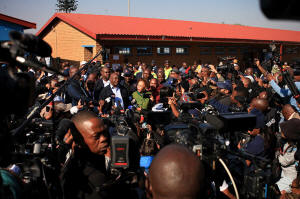South Africans vote in most competitive election since end of apartheid
 Send a link to a friend
Send a link to a friend
 [May 29, 2024]
By Wendell Roelf and Kopano Gumbi [May 29, 2024]
By Wendell Roelf and Kopano Gumbi
CAPE TOWN, South Africa (Reuters) -South Africans voted on Wednesday in
the most competitive election since the end of apartheid, with opinion
polls suggesting the African National Congress (ANC) could lose its
parliamentary majority after 30 years in government.
Queues formed in the main cities of Johannesburg, Cape Town and Durban
as polling got underway around 7 a.m. (0500 GMT), with lines also seen
in the morning cold in townships on the outskirts of cities and in rural
areas.
"I want to see change in South Africa," said Bongile Mkunqa, 53, an
unemployed man who came to vote in Langa, the oldest Black township in
Cape Town.
"We must get more jobs. I am not feeling happy now because I am
struggling. It is a long time the ANC is in charge in the country, but
it didn't change."
Voters at polling stations across the country cited high rates of
unemployment and crime, frequent power blackouts and corruption in ANC
ranks as reasons why they would vote for opposition parties, but others
were wary of change.
"Since voting started (in 1994) I have voted and I have been voting for
only one party, the ANC," said Charles Louw, 62, a pensioner who was
voting in Alexandra, a sprawling township east of Johannesburg.

He said he distrusted the promises made by opposition parties to create
jobs, end power cuts or crack down on crime.
"The ANC have been trying to do it, they are there, they have got
experience, they know how to accommodate everything. But the new
parties, where will they start?" he said.
Then led by Nelson Mandela, the ANC swept to power in South Africa's
first multi-racial election in 1994 and has won a majority in national
elections held every five years since then, though its share of the vote
has gradually declined.
If it falls short of 50% this time, the ANC will have to make a deal
with one or more smaller parties to govern - uncharted and potentially
choppy waters for a young democracy that has so far been dominated by a
single party.
The ANC is still on course to win the largest share of the vote, meaning
that its leader President Cyril Ramaphosa is likely to remain in office,
unless he faces an internal challenge if the party's performance is
worse than expected.
More than 27 million South Africans are registered to vote at more than
23,000 polling stations located in schools, sports centers and even a
funeral parlor in Pretoria. Voting will continue until 9 p.m. (1900
GMT).
Voters will elect provincial assemblies in each of the country's nine
provinces, and a new national parliament which will then choose the next
president.
'MOST CONSEQUENTIAL ELECTION'
After voting at a polling station in Soweto, a huge township outside
Johannesburg, Ramaphosa said the ANC had run a strong campaign.
"I have no doubt whatsoever in my heart of hearts that the people will
invest their confidence in the African National Congress," he said.
[to top of second column]
|

South African President Cyril Ramaphosa, accompanied by his wife
Tshepo Motsepe, speaks to the media after casting his vote during
the South African elections in Soweto, South Africa May 29, 2024.
REUTERS/Oupa Nkosi

John Steenhuisen, leader of the pro-business Democratic Alliance
(DA) party which won the second-largest share of the vote in the
last election in 2019, urged voters to turn out in large numbers to
bring change to South Africa.
"This is the most consequential election since 1994," he said after
casting his ballot in Durban.
Asked about potential coalitions, Steenhuisen said that if the
electoral math allowed it would be preferable for parties other than
the ANC to come together to govern - an outcome that seems highly
unlikely, based on opinion polls.
"I don't think we're going to solve the problems of South Africa by
keeping the same people around the same table making the same bad
decisions with the same bad results for South Africa," he said.
Etienne Olivier, 64, a logistics manager wearing a shirt with prints
of the South African flag, said he was voting for the DA because it
had a good record of competent governance in the Western Cape
province, the sole province not controlled by the ANC.
"They seem the only reasonable solution that can sort this out, the
corruption and whatever's happening in South Africa," he said after
casting his ballot in Johannesburg.
Other opposition parties hoping to loosen the ANC's grip on power
include the Economic Freedom Fighters (EFF), founded by Julius
Malema, a firebrand former leader of the ANC's youth wing. They want
to nationalize mines and banks and seize land from white farmers to
address racial and economic disparities.
Former president Jacob Zuma has fallen out with the ANC and is
backing a new party called uMkhonto we Sizwe (MK), named after the
ANC's former armed wing. Zuma, who was forced to quit as president
in 2018 after a string of scandals, has enduring influence,
particularly in his home province of KwaZulu-Natal.
The election commission is expected to start releasing partial
results within hours of polling stations closing. The commission has
seven days to announce final results but at the last election, also
held on a Wednesday, it did so on a Saturday.
(Additional reporting by Tannur Anders, Nqobile Dludla, Anait
Miridzhanian and Bhargav AcharyaWriting by Estelle Shirbon and
Alexander WinningEditing by Gareth Jones, Andrew Heavens and Emelia
Sithole-Matarise)
[© 2024 Thomson Reuters. All rights reserved.]This material
may not be published, broadcast, rewritten or redistributed.
Thompson Reuters is solely responsible for this content.
 |